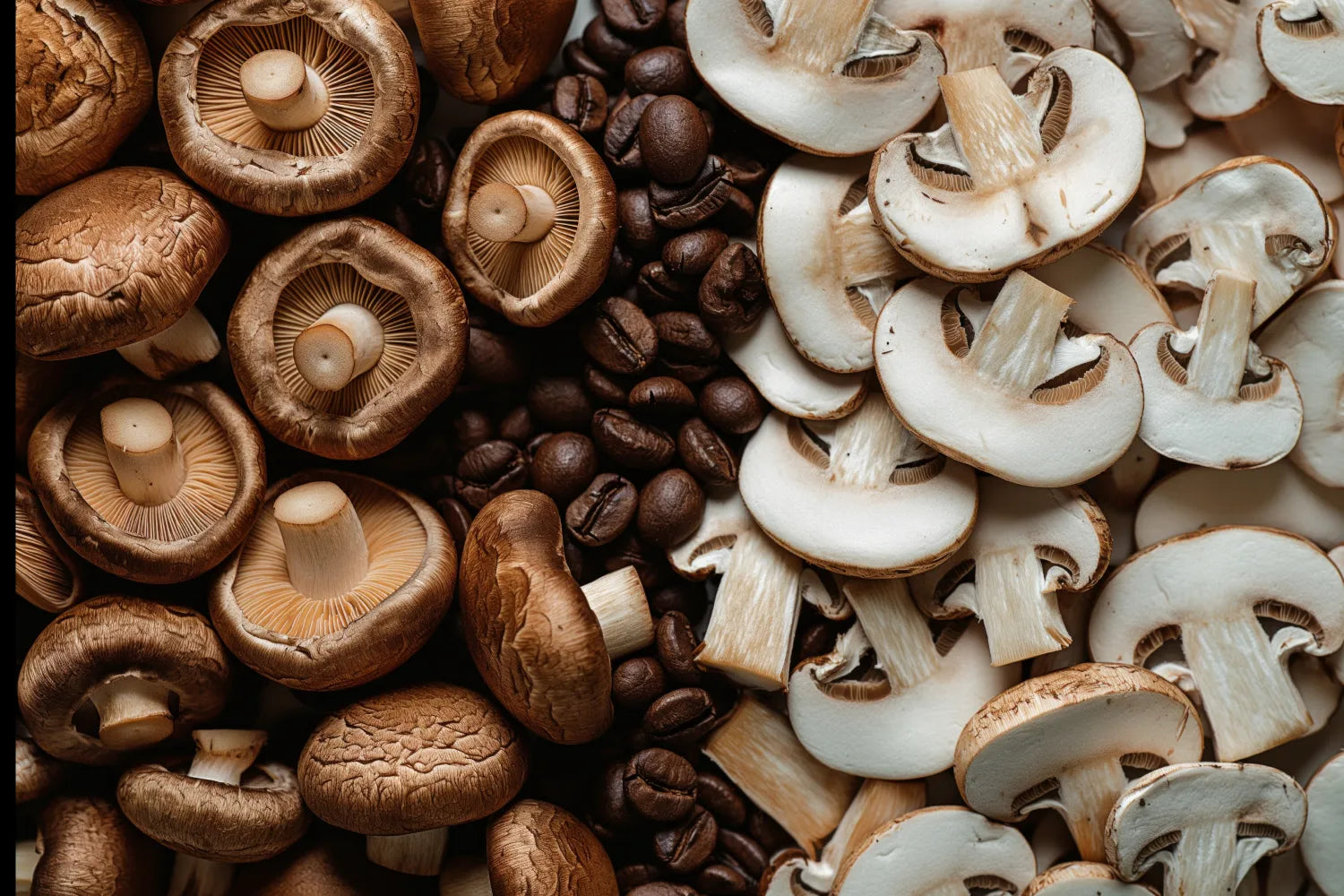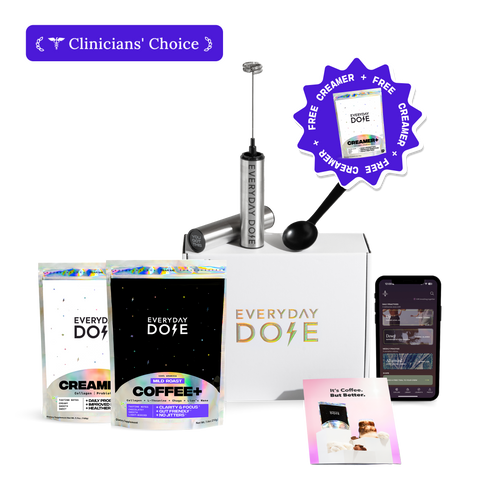What To Look For in Mushroom Coffee: A Buying & Quality Guide

Are you finally ready to take the plunge and buy some mushroom coffee? You might think it’s as simple as typing in “mushroom coffee” on Google and clicking the first option that comes up. And truly, we wish it was that simple.
However, not all mushroom coffees are created equal, and there are several factors you need to weigh before choosing a brand that matches up with the things you’re looking for. At first, this can feel overwhelming. Don’t worry, though — read on to learn everything you need to know about what to look for in mushroom coffee and why it matters.
Why Quality Matters
First of all, we’d like to address the biggest question you’re probably thinking of right now. Why does it matter which brand you choose? Aren’t all mushroom coffees basically the same? The answers to these questions come down to the basic question of quality.
We’re sad to say it, but some manufacturers’ only goal is to sell their product. They use the cheapest ingredients and are willing to sacrifice effectiveness to lower their bottom line. The worst part is, thanks to shady marketing tactics, you likely won’t know you’re purchasing a subpar product. That’s why it’s important to know what to look for.
That said, there are companies that actually care about delivering a high-quality product. They hold their ingredients to the highest standard, they use superior production techniques, and the formulas they use are designed with benefits in mind. While there are plenty of brands out there that fit this description, you can rest assured that Everyday Dose is definitely one of them.
Key Things To Look For in Mushroom Coffee
Now, moving on to the reason you clicked on this article in the first place. Read on for a full list of everything you should consider when buying mushroom coffee.
1. Mushroom Extract, Not Powder
First of all, it’s important to look at how the mushrooms are processed. At first glance, it might seem like mushroom powders are the best option. This way you’re getting the whole mushroom, right?
The whole point of including mushrooms in a coffee blend is to experience the benefits of the different compounds they contain. However, these compounds are locked away behind layers of a hard substance called chitin.
When we simply eat mushrooms, our bodies can’t break down the chitin to absorb the good chemicals. We might get some benefits, but definitely not the full benefits package we were looking for.
To make these compounds more available to our bodies, they must first be extracted using hot water. Think of it as a treasure locked inside a treasure chest; extraction is the key. That’s why our Mushroom Coffee+ is made using mushrooms that have been extracted not once, but twice.
2. Fruiting Bodies, Not Mycelium
There are two main parts of a mushroom: the fruiting body and the mycelium. Fruiting bodies are the parts of the mushroom we’re used to seeing above ground. They’re the parts of the mushroom that will eventually release spores to help the fungus reproduce.
Mycelium, on the other hand, is like a vast network of hair-thin strands that seek out nutrients to feed the fungus. Its function is similar to the roots of a plant, although it’s made out of a different material.
Most mushrooms simply exist as mycelium — they only form fruiting bodies when the conditions are perfect. Because of this, it’s much easier to use mycelium to make mushroom coffee.
However, mycelium is not as nutritionally dense as fruiting bodies. Unfortunately, the only way to really tell how a product is made is to read up on the company and check to see if the label says anything about it. At Everyday Dose, you can rest assured that we only use 100 percent fruiting body extracts in our mushroom coffee.
3. Wood-Grown, Not Grain-Fed
All mushrooms need a substrate (or food) to survive. In the wild, mushrooms grow on trees and other organic matter. In fact, many mushrooms have a symbiotic relationship with trees. Unfortunately, it’s much cheaper and easier to grow mushrooms on grains like rice or oats.
We’ve probably all heard the saying, “You are what you eat.” The same is true for mushrooms. If you feed a mushroom less nutritionally dense grains, you’ll get a less nutritionally dense mushroom.
That’s why we grow all of our medicinal mushrooms on wood and forage for them. It’s not just about giving our customers the best product possible — it’s about treating nature with respect.
4. Supporting Ingredients
Sure, functional mushrooms might be the stars of the show when it comes to mushroom coffee, but they’re not the only actors on the stage. Most mushroom coffee brands also include other ingredients to help provide certain benefits or improve the flavor.
We can’t speak for other companies, but we can tell you what ingredients go into our mushroom coffee. Alongside lion’s mane and chaga mushrooms (which support focus, gut health, and immunity), we also include collagen protein to support the gut lining, coffee extract to support focus and provide the coffee taste we all know and love, and L-theanine to encourage focus and relaxation.
5. Lab-Tested
Mushroom coffee brands don’t technically have to test their products, but the ones who care know that it’s the best way to make sure they’re delivering the highest quality coffee. Some tests you can look for include:
- Beta Glucans: This prebiotic fiber can help support good gut bacteria.
- Mold: It’s possible for mushroom coffee to be contaminated with mold, which can cause numerous health problems.
- Mycotoxins: Mycotoxins are toxins produced by mold. Even if mushroom coffee doesn’t have mold, it can still contain mycotoxins from nearby mold.
- Allergens: If you have a serious allergy, you can rest assured that your mushroom coffee is safe to drink.
- Heavy Metals: Heavy metals tend to build up in our systems over time and can cause many health concerns if they’re not detoxed (did you know lion’s mane can help with that?).
6. Low-Caf
Finally, you might be surprised to learn that not all mushroom coffee products are low in caffeine. Many people drink mushroom coffee as a way to cut back on caffeine, but some people want to enjoy the benefits of medicinal mushrooms while also receiving a full dose of caffeine.
After doing some research, we decided not to go this route. While some people might be used to drinking over a hundred milligrams of caffeine at once, we’ve actually noticed that around 40 milligrams is enough to experience the mood lift and get-up-and-go feeling that most people drink coffee for.
Plus, 40 milligrams generally isn’t enough to contribute to side effects like jitters, especially since our blend contains L-theanine. This amino acid can minimize the negative effects of caffeine.
The Bottom Line
If you’re looking to get in on the magic of mushroom coffee, we wholeheartedly support you. After all, we’ve seen the benefits of mushroom coffee for ourselves — that’s why we’ve dedicated our time to making it available for everyone!
That said, not all mushroom coffees are created equal. In general, make sure you look for a brand that uses mushroom extracts made with wood-grown fruiting bodies. It’s also important to look for lab-tested, low-caffeine options made with high-quality supporting ingredients. Don’t just take our word for it, though — try the difference for yourself today with one of our mushroom blends.
Sources:
Mycelium: Exploring the hidden dimension of fungi | Kew
Mushrooms and Their Relationships with Trees | Trees Atlanta
L-theanine partially counteracts caffeine-induced sleep disturbances in rats | PubMed
s/all/nootropics-mushrooms-side-effects
Start your day
The Right Way









